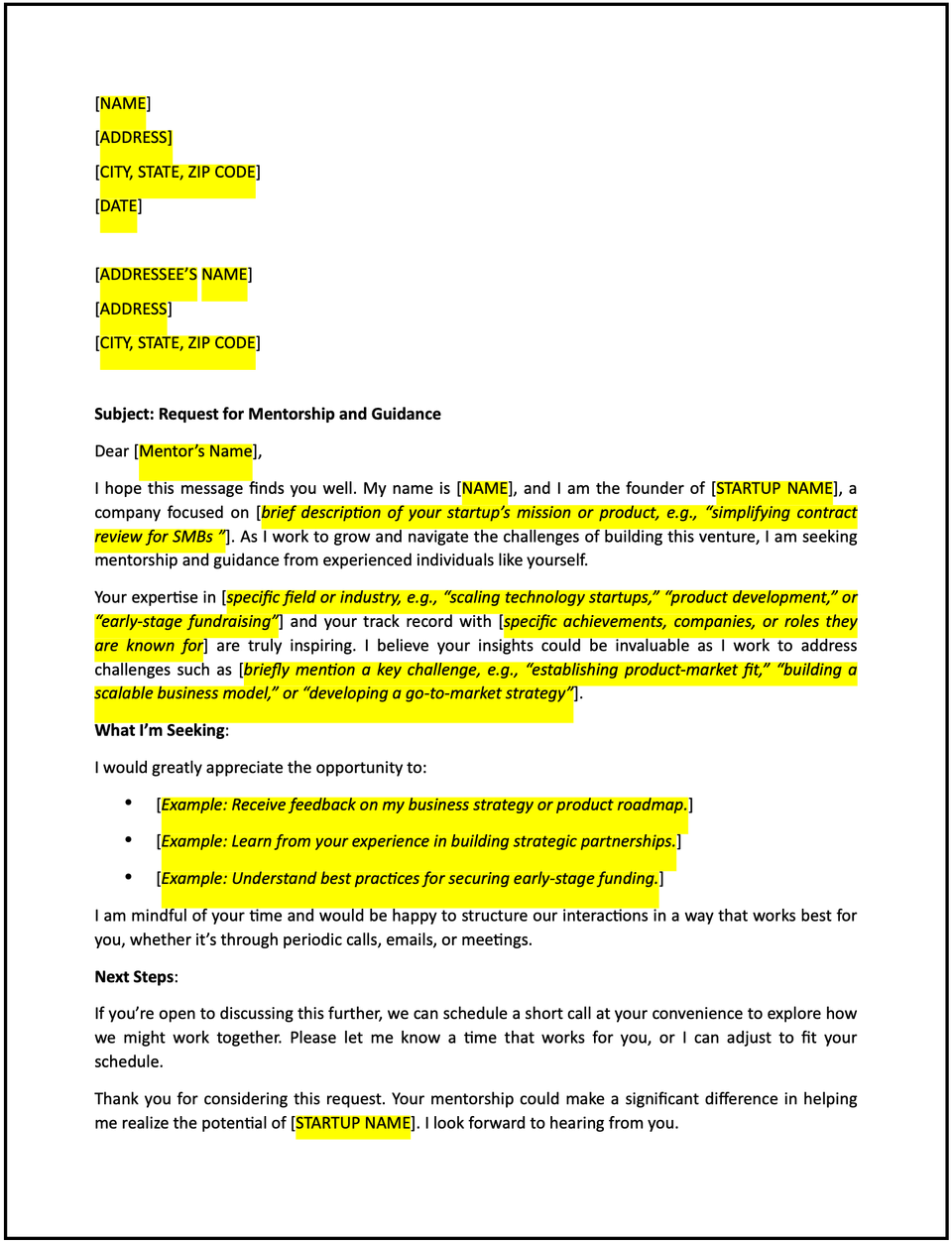Letter of request for mentorship and guidance: Free template

Letter of request for mentorship and guidance
A letter of request for mentorship and guidance is a formal communication used to seek the support of an experienced professional in providing advice, feedback, and insights to help achieve personal or professional goals. This letter highlights your aspirations, reasons for choosing the mentor, and mutual benefits of the relationship.
How to use this letter of request for mentorship and guidance
- Open with an introduction: Address the recipient respectfully and acknowledge their expertise, achievements, or influence in the field.
- State the purpose: Clearly communicate your intent to request mentorship and outline the areas where you seek guidance.
- Provide context: Briefly describe your background, goals, and why their mentorship aligns with your aspirations.
- Highlight the mentor’s impact: Emphasize how their experience and insights could help address specific challenges or opportunities.
- Outline expectations: Specify the kind of mentorship you’re looking for, such as regular meetings, career advice, or project feedback.
- Reassure flexibility: Express your willingness to adapt to their availability and preferences.
- Emphasize mutual benefits: Highlight how the relationship could be rewarding for both parties, such as sharing perspectives or contributing to their legacy.
- Maintain a professional tone: Ensure the letter is clear, respectful, and focused on fostering a meaningful connection.
- Provide contact information: Include details for the recipient to reach out with questions or schedule a discussion.
Benefits of using a letter of request for mentorship and guidance
This letter ensures a structured and professional way to seek mentorship while fostering trust and mutual respect. Here’s how it helps:
- Promotes clarity: Clearly outlining your goals and expectations helps the mentor understand how to support you effectively.
- Reflects professionalism: A well-crafted letter demonstrates respect and a commitment to personal growth.
- Encourages engagement: Highlighting the mentor’s impact inspires them to support your journey.
- Builds trust: Transparent communication fosters goodwill and a collaborative relationship.
- Supports growth: Receiving mentorship provides guidance, networks, and insights that accelerate progress.
Tips for writing an effective letter of request for mentorship and guidance
- Be specific: Clearly describe the areas where you seek mentorship and why their expertise is relevant.
- Use professional language: Maintain a respectful and appreciative tone to foster trust and collaboration.
- Provide context: Briefly explain your background, aspirations, and challenges that mentorship could help address.
- Highlight mutual benefits: Emphasize how the relationship can be meaningful and rewarding for the mentor as well.
- Include actionable steps: Share clear instructions for next steps, such as scheduling an initial meeting or call.
- Keep it concise: Focus on the essential points while ensuring the tone is professional and engaging.
Frequently asked questions (FAQs)
Q: What details should I include in this letter?
A: Include your background, specific areas where you seek guidance, and reasons for choosing the mentor.
Q: Should I personalize the letter?
A: Yes, addressing the mentor by name and referencing their specific expertise or achievements demonstrates attentiveness and respect.
Q: Who typically sends this letter?
A: Professionals, students, or entrepreneurs seeking career or industry guidance typically send this letter.
Q: How formal should this letter be?
A: The tone should be professional, respectful, and collaborative to foster trust and engagement.
Q: When should this letter be sent?
A: Send the letter at a time when you’ve identified clear goals and areas where mentorship is needed.
Q: Can this letter request specific outcomes?
A: Yes, mentioning desired outcomes or milestones provides clarity and focus for the mentorship.
Q: Is acknowledgment from the recipient required?
A: While not mandatory, requesting acknowledgment ensures the recipient is considering your request.
This article contains general legal information and does not contain legal advice. Cobrief is not a law firm or a substitute for an attorney or law firm. The law is complex and changes often. For legal advice, please ask a lawyer.


